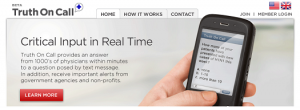Ushahidi Enables Real-Time Crisis Mapping in Haiti

Mobile giving to Haiti has topped $30 million, but wireless devices on the ground in Haiti are helping relief efforts as well. Haiti.ushahidi.com (testimony in Swahili) is a crisis map of Haiti that allows for people on the ground there to report emergencies and missing persons after the January 12 disaster.
By texting to 4636, Haitians can report their location and their needs -- things like food and medical supplies, lists of survivors, even amputations. The service is being promoted on the ground by FEMA, the Red Cross International, and the U.N Foundation, the Clinton Foundation and others. In addition to SMS, reports can be contributed via web, email, radio, satellite phone, Twitter, Facebook, TV, listserves, livestreams and situation reports. All the collected information is mapped in close to real time on the site.

The incoming data is largely unstructured, so efforts to parse it are being crowdsourced. According to the site, volunteers at the Fletcher School's Situation Room are mapping about 50% of the reports 24 hours a day. The other 50% of reports come from the Ushahidi team and volunteers around the world. All reported incidents are available for download in .csv format -- right now there are about 1550. Each one includes an incident title, date, location, description, category, latitude and longitude and whether the submission was approved and verified.
The site also links to other crowdsourced efforts, including The Extraordinaries, which lets you tag photos coming in from the news, so they can better match images against missing persons databases, and Google.org's Person Finder, a gadget that lets people submit information about missing persons and to search the database.
Crowdsourcing and citizen journalism efforts like this have been on the rise over the past few years with mobile taking a major role. Indeed, the phone is becoming a global equalizer, as we saw during the Iranian elections last summer. Mobile tools especially make sense in Haiti. According to a report from Research and Markets, Haiti’s fixed line teledensity was amongst the lowest in the world in early 2009, at less than 2%, while mobile penetration was over 40% in September 2008 and growing strongly. Given the stagnating fixed-line infrastructure and poor fixed-line penetration rates, the report concluded that mobile is likely to remain the principal form of telecommunications for the short-to-medium term.
Ushahidi itself is a great example of how mobile is being used to empower citizens in places where wired Internet access is low. The platform was initially created to map reports of violence in Kenya after the post-election fallout at the beginning of 2008. Reports were submitted via the web and mobile phone and, according to the site, this initial deployment had 45,000 users in Kenya. Since then, it has developed into a larger-scale open source project for mobile citizen journalism. Their goal is to create a customizable platform that allows for any person or organization to set up their own way to collect and visualize information. It's alpha version was used by a number of groups and institutions including Al Jazeera during the War on Gaza, Vote Report India (to monitor the recent local elections) and Pak Voices (to map incidents of violence in Pakistan). Now in beta, is continually being tested with various partners, primarily in Kenya.
Thanks to Oscar Salazar for telling us about this project.








